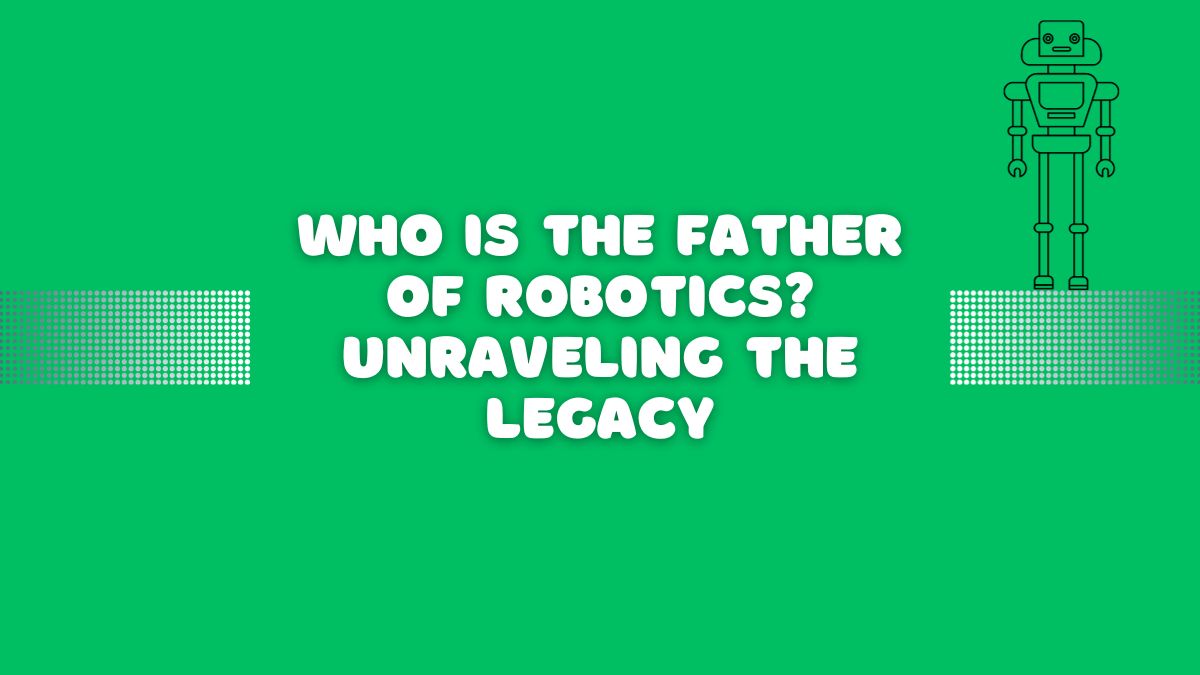Robotics is a field that has revolutionized our lives in ways we couldn’t have imagined a few decades ago. But have you ever wondered who the mastermind behind this incredible innovation was?
In this blog, we will be exploring the life and contributions of the ‘Father of Robotics.’ From his early life to his signature innovations, we will delve into how he impacted modern robotics as we know it today. We will also explore how his legacy continues to inspire future developments in this field.
So whether you are an avid fan of robotics or just curious about the history of technology, join us on this journey to discover the man behind the machines.
The Genesis of Robotics: A Brief Overview
In the realm of mechanical engineering, robotics finds its roots in the ingenious devices crafted during the 12th century. Considered as the first industrial robot book, “The book of knowledge of ingenious mechanical devices” lays the foundation for what we know as robotics today.
It was Joseph Engelberger, an American engineer, who significantly contributed to the development of robotics, paving the way for the golden age of artificial intelligence and service robots. His innovative work has left a lasting impact on modern times and continues to shape the field of robotics in the 21st century.
The Early Innovations
During the 12th century, Ismail Al Jazari, a Muslim inventor, made significant strides in robotics with his book, “The Book of Knowledge of Ingenious Devices,” featuring water pumps and water clocks, among other inventive devices.
Notably, the peacock fountain, a remarkable robotic water clock, exemplifies his artistic and mechanical prowess, signifying the early innovations in the field. Al Jazari’s contributions laid the groundwork for the golden age of robotics, influencing key trends that continue to shape modern times.
Role of Mathematics and Engineering in Robotics
In the golden age of robotics, Ismail al Jazari showcased the pivotal role of mathematics and engineering. His ingenious creations, such as practical machines and water supply systems, demonstrated a blend of artful detail with functional design. As the chief engineer, al Jazari’s contributions included innovative water pumps and music box mechanisms, which are on display at the Topkapi Sarayi Museum, attesting to their enduring influence on modern engineering.
The Protagonist: ‘Father of Robotics’

Al Jazari, an inventive figure in the Islamic world, is often hailed as the pioneer of robotics, with science historians underscoring his substantial influence. Renowned for his water clocks, robotic contraptions, and mechanical expertise, his work exemplifies the inception of robotics during a golden age. Al Jazari’s legacy echoes through the centuries and continues to inspire key trends in modern times, signifying his enduring impact on the evolution of robotics.
Birth and Early Life
Born in the Artuqid dynasty of Jazira, Al Jazari is acknowledged as the father of robotics in the Muslim world. His mechanical genius is evidenced by his combination lock, water pumps, and elephant clock inventions. Historians of science celebrate his work as a pioneering contribution to robotics.
Al Jazari’s influence on modern engineering is still felt today, marking a significant milestone in the golden age of robotics. His innovative mechanisms and techniques paved the way for future developments in the field, shaping the landscape of robotics in the Western world.
Education and Influences
Renowned as the father of robotics, Al Jazari drew inspiration from his Islamic upbringing and engineering knowledge, revolutionizing the use of robots and mechanical engineering. Historians highlight the water supply systems, robotic arm, and artistic detail of his devices as a showcase of his engineering prowess.
This engineering genius from the Islamic world made significant contributions that had a lasting impact on modern times, paving the way for key trends in artificial intelligence and service robots. His work continues to inspire innovations in robotics, resonating throughout the golden age of robotics.
Signature Contributions to Robotics
Al Jazari’s ingenious contributions set the stage for modern robotics, marking a golden age in technological advancement. His pioneering robotic devices and mechanical inventions laid the foundation for future developments in artificial intelligence. Notably, his combination lock, water clock, and peacock fountain stand testament to his engineering brilliance, offering invaluable insights into the key trends that shaped the future of robotics.
His book of ingenious devices remains a hallmark of his legacy, reflecting the impactful influence of Al Jazari on the evolution of service robots in the western world.
Mechanisms and Techniques Innovated
Al Jazari’s expertise in practical machines is evident through his mechanical devices, water pumps, and the iconic elephant clock. Historically described as a mechanical engineer, he showcased pioneering robotics by incorporating combination locks, advanced water supply systems, and the utilization of robots. His impactful legacy continues to resonate, shaping the world of robotics with his innovative techniques and mechanisms.
Noteworthy Robotic Creations
Celebrated as pioneering robotic creations, Al Jazari’s water clock, robotic arm, and peacock fountain stand as testament to his innovative genius. His use of robots, water pumps, and artistic detail set a new standard in robotic innovation, showcasing his mastery of practical machines. The elephant clock, combination lock, and water supply devices further highlight his mechanical engineering brilliance, leaving a lasting impact on the world of robotics. Al Jazari’s creations paved the way for key trends in modern times, shaping the golden age of robotics.
The Legacy: Impact on Modern Robotics
In modern times, the legacy of Ismail al Jazari, recognized as the father of robotics, continues to inspire key trends in robotics. His pioneering work, as examined by science historians, is fundamental in shaping the future of robotics, reflecting the golden age of innovative mechanical engineering.
The National Geographic Society’s acknowledgment of al Jazari as the father of robotics highlights his indelible mark on the western world of robotics, affirming his enduring influence on the field.
How His Work Inspired Future Developments
Al Jazari’s mechanical advancements in his book of knowledge set the stage for modern engineering, inspiring key trends in the Western world. His intricate devices and artistic details continue to be admired by historians of science, offering a glimpse into the golden age of innovative mechanical engineering.
From water pumps to music boxes, his practical machines from centuries ago still influence modern times, showcasing the enduring impact of his work on future developments in robotics and artificial intelligence.
Is Modern Robotics Truly Rooted in His Innovations?
Al Jazari, a chief engineer of the artuqid dynasty, is considered the father of robotics. His book of ingenious devices and mechanical creations showcased his influential contributions to the field. Historians celebrate Al Jazari’s impact on robotics, but is modern robotics truly rooted in his innovations?
Conclusion
In conclusion, the field of robotics owes its existence to the pioneering work of a visionary individual. Through his innovative ideas, groundbreaking creations, and relentless passion for the subject, he has rightfully earned the title of the “Father of Robotics.”
His contributions have shaped the course of this field, inspiring countless researchers, engineers, and enthusiasts to push the boundaries of what is possible. Today, we witness his legacy in the form of advanced robots and automation systems that have revolutionized industries and transformed our daily lives.
As we continue to explore the potential of robotics, it is important to remember and honor the remarkable achievements of the one who started it all.
FAQs: Who is the Father of Robotics?
Why is Joseph Engelberger the father of robotics?
Joseph Engelberger is considered the father of robotics because he pioneered the development and marketing of industrial robots. Co-founding Unimation, the first robotics company, in 1956, his groundbreaking work revolutionized manufacturing processes and laid the foundation for future advancements in robotics technology. Engelberger’s contributions earned him numerous accolades throughout his lifetime.
Who is the mother of robotics?
While there is no universally accepted “mother of robotics,” notable female figures in the field include Cynthia Breazeal and Hiroko Kitano. Ada Lovelace, often credited as the first computer programmer, also made contributions to computing and automation. The field of robotics has been shaped by numerous individuals, regardless of gender.
- What are the four main layers of computer architecture? - September 26, 2024
- How to Clear DNS Cache Using Chrome Net Internals - September 17, 2024
- How Can Communication Platforms Improve Business Operations and Customer Engagement? - August 12, 2024

